Unit 5 You’re supposed to shake hands. Section A (1a-2d)必会清单以及知识闯关(含答案)
文档属性
| 名称 | Unit 5 You’re supposed to shake hands. Section A (1a-2d)必会清单以及知识闯关(含答案) |
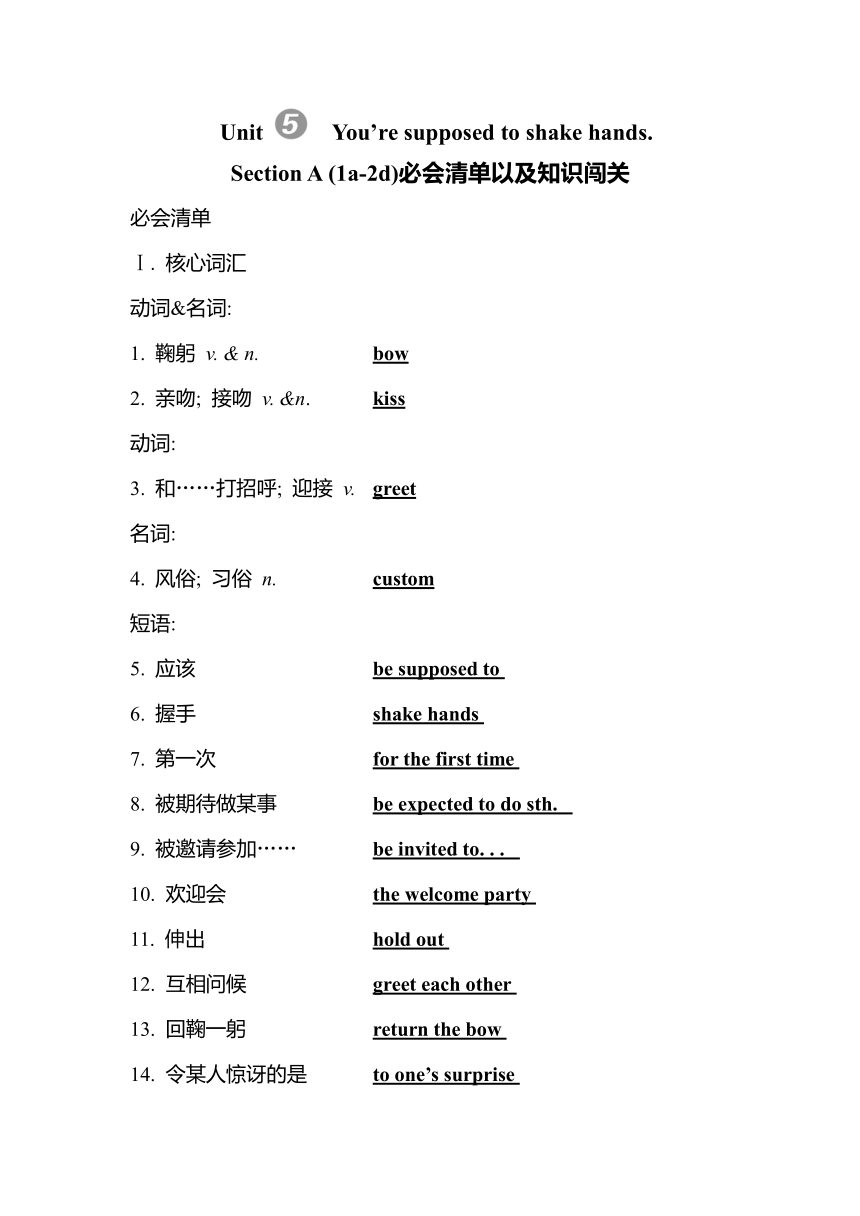
|
|
| 格式 | docx | ||
| 文件大小 | 169.0KB | ||
| 资源类型 | 教案 | ||
| 版本资源 | 鲁教版 | ||
| 科目 | 英语 | ||
| 更新时间 | 2024-02-07 09:58:36 | ||
图片预览

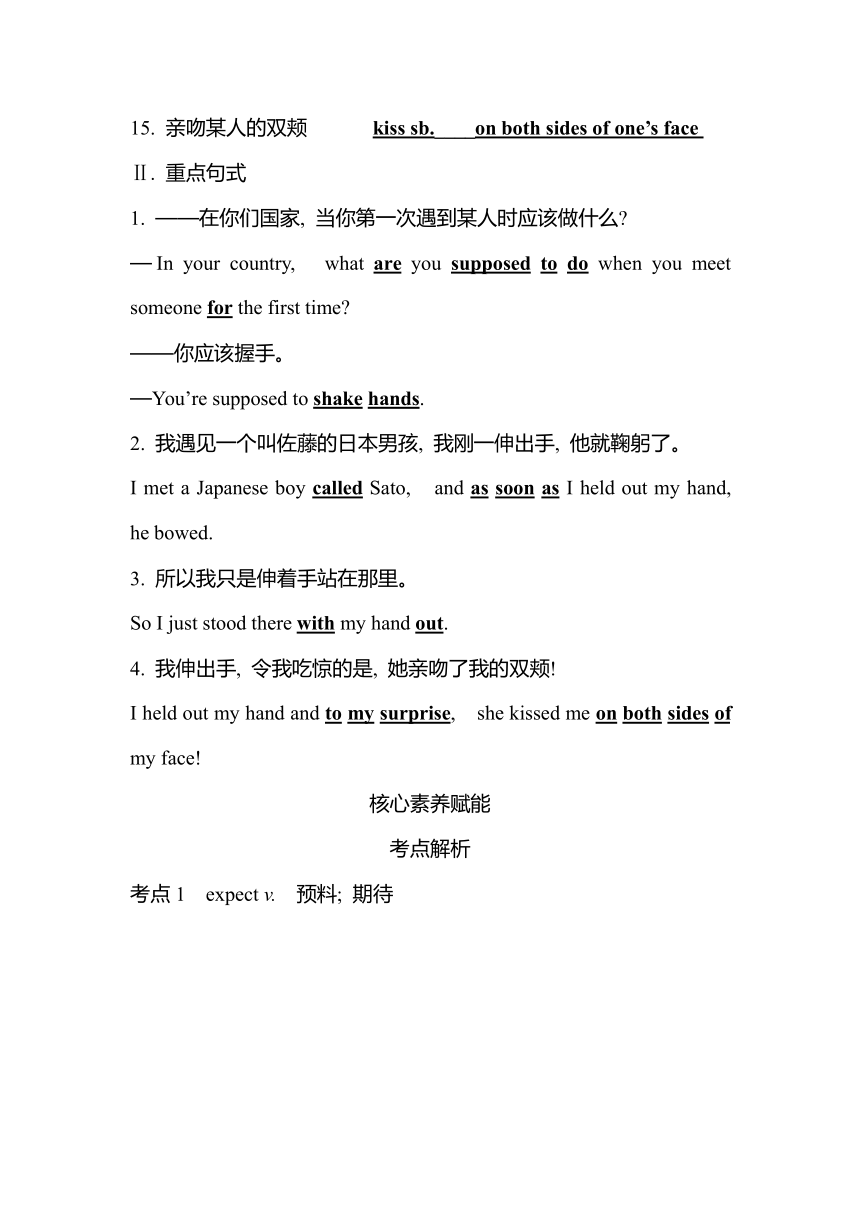
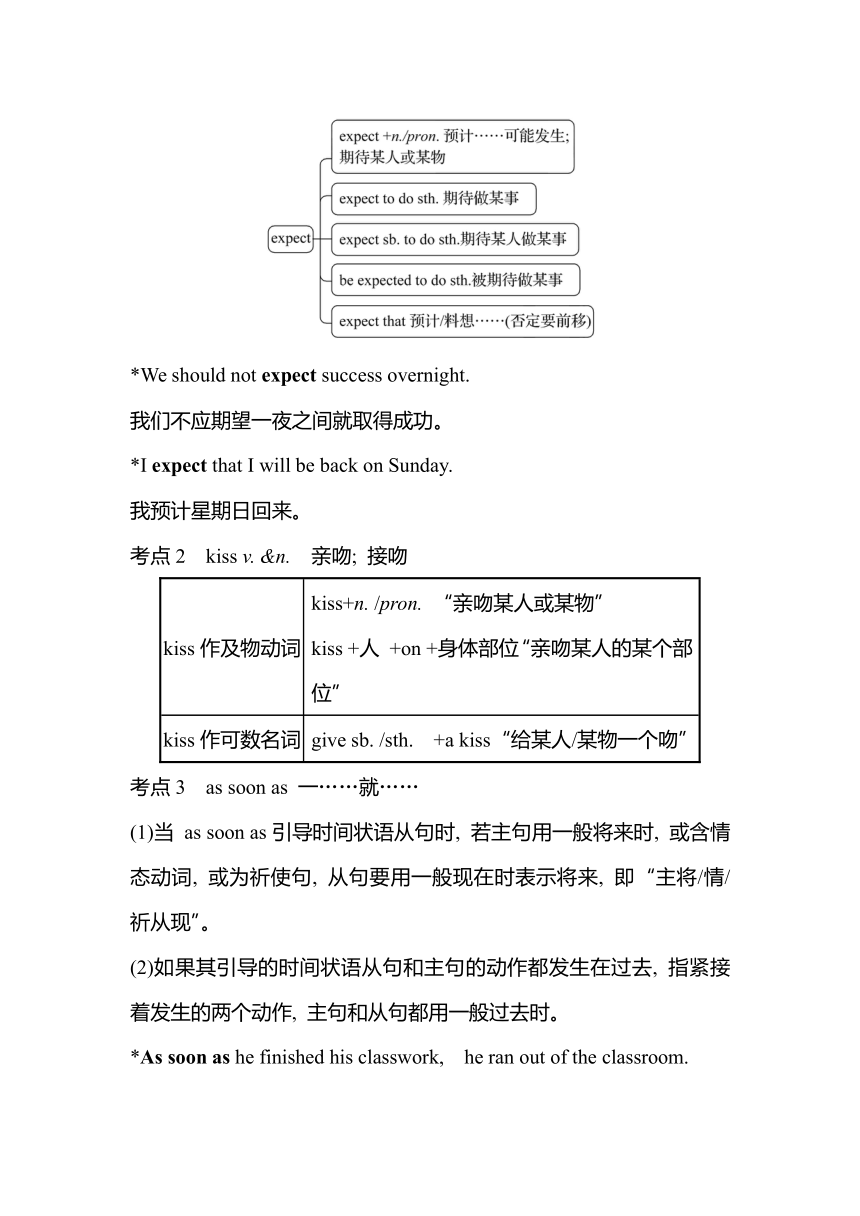
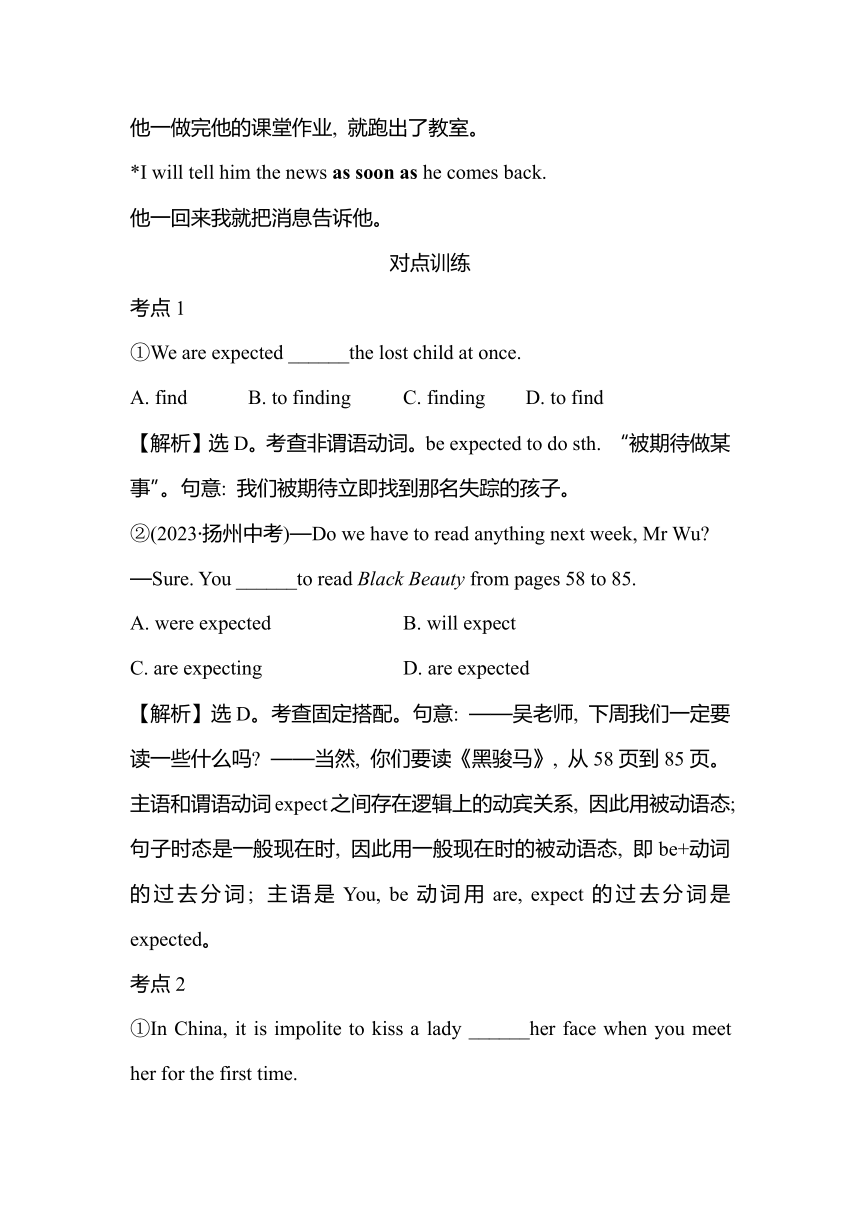
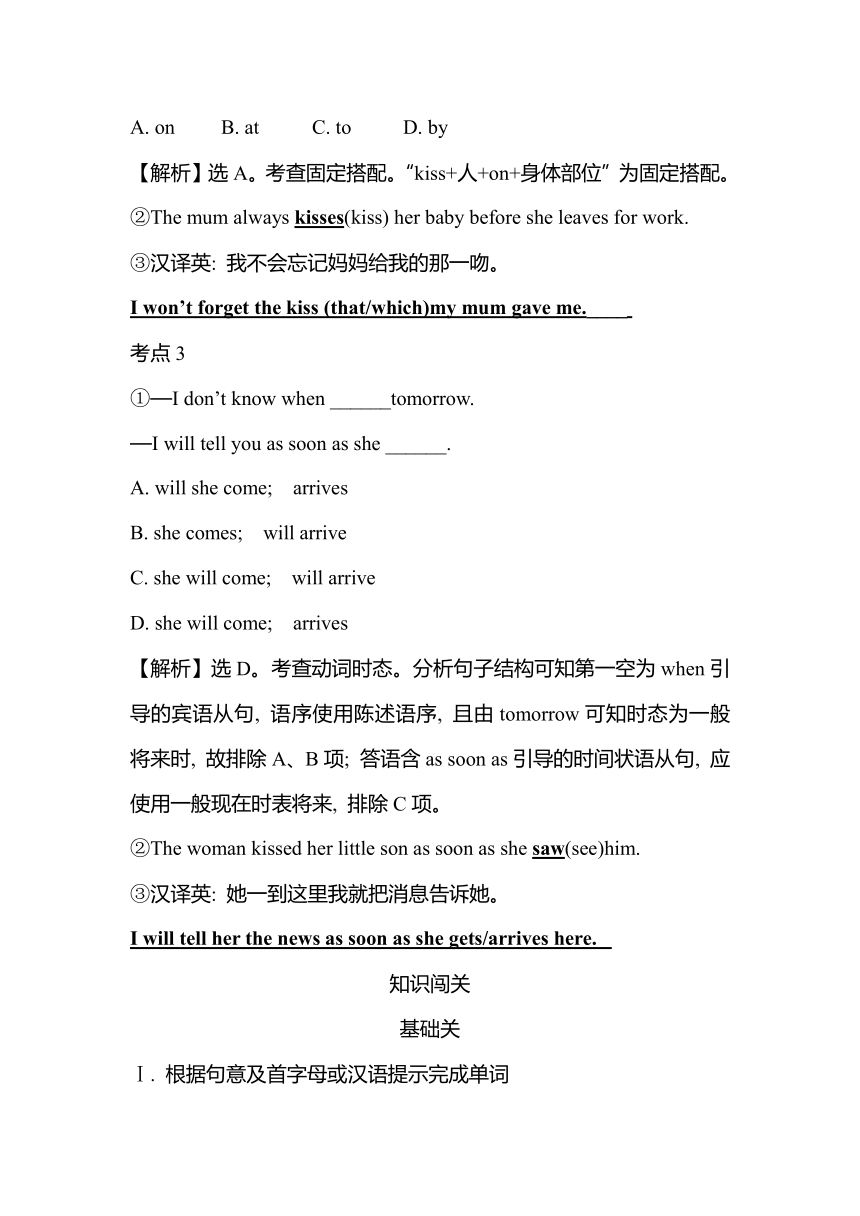
文档简介
Unit You’re supposed to shake hands.
Section A (1a-2d)必会清单以及知识闯关
必会清单
Ⅰ. 核心词汇
动词&名词:
1. 鞠躬 v. & n. bow
2. 亲吻; 接吻 v. &n. kiss
动词:
3. 和……打招呼; 迎接 v. greet
名词:
4. 风俗; 习俗 n. custom
短语:
5. 应该 be supposed to
6. 握手 shake hands
7. 第一次 for the first time
8. 被期待做某事 be expected to do sth.
9. 被邀请参加…… be invited to. . .
10. 欢迎会 the welcome party
11. 伸出 hold out
12. 互相问候 greet each other
13. 回鞠一躬 return the bow
14. 令某人惊讶的是 to one’s surprise
15. 亲吻某人的双颊 kiss sb.____on both sides of one’s face
Ⅱ. 重点句式
1. ——在你们国家, 当你第一次遇到某人时应该做什么
—In your country, what are you supposed to do when you meet someone for the first time
——你应该握手。
—You’re supposed to shake hands.
2. 我遇见一个叫佐藤的日本男孩, 我刚一伸出手, 他就鞠躬了。
I met a Japanese boy called Sato, and as soon as I held out my hand, he bowed.
3. 所以我只是伸着手站在那里。
So I just stood there with my hand out.
4. 我伸出手, 令我吃惊的是, 她亲吻了我的双颊!
I held out my hand and to my surprise, she kissed me on both sides of my face!
核心素养赋能
考点解析
考点1 expect v. 预料; 期待
*We should not expect success overnight.
我们不应期望一夜之间就取得成功。
*I expect that I will be back on Sunday.
我预计星期日回来。
考点2 kiss v. &n. 亲吻; 接吻
kiss作及物动词 kiss+n. /pron. “亲吻某人或某物” kiss +人 +on +身体部位“亲吻某人的某个部位”
kiss作可数名词 give sb. /sth. +a kiss“给某人/某物一个吻”
考点3 as soon as 一……就……
(1)当 as soon as引导时间状语从句时, 若主句用一般将来时, 或含情态动词, 或为祈使句, 从句要用一般现在时表示将来, 即“主将/情/祈从现”。
(2)如果其引导的时间状语从句和主句的动作都发生在过去, 指紧接着发生的两个动作, 主句和从句都用一般过去时。
*As soon as he finished his classwork, he ran out of the classroom.
他一做完他的课堂作业, 就跑出了教室。
*I will tell him the news as soon as he comes back.
他一回来我就把消息告诉他。
对点训练
考点1
①We are expected ______the lost child at once.
A. find B. to finding C. finding D. to find
【解析】选D。考查非谓语动词。be expected to do sth. “被期待做某事”。句意: 我们被期待立即找到那名失踪的孩子。
②(2023·扬州中考)—Do we have to read anything next week, Mr Wu
—Sure. You ______to read Black Beauty from pages 58 to 85.
A. were expected B. will expect
C. are expecting D. are expected
【解析】选D。考查固定搭配。句意: ——吴老师, 下周我们一定要读一些什么吗 ——当然, 你们要读《黑骏马》, 从58页到85页。主语和谓语动词expect之间存在逻辑上的动宾关系, 因此用被动语态; 句子时态是一般现在时, 因此用一般现在时的被动语态, 即be+动词的过去分词; 主语是You, be动词用are, expect的过去分词是expected。
考点2
①In China, it is impolite to kiss a lady ______her face when you meet her for the first time.
A. on B. at C. to D. by
【解析】选A。考查固定搭配。“kiss+人+on+身体部位”为固定搭配。
②The mum always kisses(kiss) her baby before she leaves for work.
③汉译英: 我不会忘记妈妈给我的那一吻。
I won’t forget the kiss (that/which)my mum gave me.____
考点3
①—I don’t know when ______tomorrow.
—I will tell you as soon as she ______.
A. will she come; arrives
B. she comes; will arrive
C. she will come; will arrive
D. she will come; arrives
【解析】选D。考查动词时态。分析句子结构可知第一空为when引导的宾语从句, 语序使用陈述语序, 且由tomorrow可知时态为一般将来时, 故排除A、B项; 答语含as soon as引导的时间状语从句, 应使用一般现在时表将来, 排除C项。
②The woman kissed her little son as soon as she saw(see)him.
③汉译英: 她一到这里我就把消息告诉她。
I will tell her the news as soon as she gets/arrives here.
知识闯关
基础关
Ⅰ. 根据句意及首字母或汉语提示完成单词
1. In Japan and Korea, people usually bow to each other when they meet.
2. The two old friends hugged and kissed each other on both cheeks (面颊).
3. People in different places have different customs(风俗).
4. It is important to greet(问候) others in the right way.
5. It’s impolite(不礼貌的) if you don’t return a bow in Japan.
Ⅱ. 用所给词的适当形式填空
1. If you are invited(invite)to the party, you should be on time.
2. You are expected(expect) to get a better grade next time.
3. Everyone is supposed to follow(follow) the traffic rules.
4. Is there a boy student called(call) Tom Brown in your class
5. In China, people usually shake hands(hand) when they meet for the first time.
Ⅲ. 单项选择
1. Amy always ______her classmates in a strange way.
A. sees B. listens C. greets D. gives
【解析】选C。考查动词辨析。 see看见; listen听(不及物动词); greet问候, 打招呼; give给。句意: 艾米总是以一种奇怪的方式和她的同班同学们打招呼。
2. Excuse me, would you mind ______your voice down, please
A. to keep B. keeping C. keep D. kept
【解析】选B。考查非谓语动词。mind doing sth. (介意做某事)为固定搭配。句意: 打扰了, 你介意声音小一点吗
3. There are many people on ______sides of the street.
A. each B. either C. all D. both
【解析】选D。考查不定代词辨析。each每一个, 后加名词单数, 表示两个或两个以上中的每一个; either两者之一, 后加名词单数; all三者或三者以上全都, 后加名词复数; both两者都, 后加名词复数。on both sides of the street表示“在街道的两边”。句意: 街道的两边有很多人。
4. What ______you ______to do when you meet your teacher
A. do; supposed B. are; suppose
C. do; suppose D. are; supposed
【解析】选D。考查固定短语。短语be supposed to do sth. 应该做某事; 主语是you, be动词用are。句意: 当你见到你的老师时, 你应该做什么
5. The clever boy called 120 ______his mother fell down in the kitchen.
A. although B. as soon as
C. as long as D. until
【解析】选B。考查连词辨析。although尽管; as soon as一……就……; as long as只要; until直到……。 句意: 妈妈在厨房里刚一跌倒, 那个聪明的男孩就拨打了120。此处用as soon as引导时间状语从句。
能力关
Ⅳ. 阅读理解
What is the meaning of a kiss That depends on where you are. A kiss means“I love you” in many countries, but not everywhere. In some countries, a kiss can be a friendly greeting, or a goodbye. South Americans and Europeans say hello with kisses much more often than North Americans. They also sometimes say goodbye by kissing their own fingertips and “then blowing” the kiss away. In these areas, men at business meetings might even greet each other with a kiss on the cheek, instead of a handshake. Most North Americans would consider this very strange.
Then it is believed that kissing has a special meaning. In ancient Rome, a kiss was seen as a legal agreement. That’s why the new couple at a wedding must kiss each other. And did your mother ever kiss your wounded finger to make the pain stop That custom comes from England. People there used to think that kisses had magical powers.
Not everyone in the world kisses though. In past centuries, European explorers found many places where kissing was never seen. For example, Eskimo couples rubbed their noses together instead of touching lips, and so did some African tribes and Pacific Islanders. The Ainu of Japan preferred to bite their loved one’s cheek.
These days, kissing is mostly a sign of romance. Thanks to international travel and sharing customs, that meaning has become general.
1. Which of the following sentences is true
A. Today kissing will magically heal wounded fingers.
B. Today people never kiss their children’s wounded fingers.
C. Today people still believe that kisses have magical powers.
D. People from England used to think that kisses had magical powers.
【解析】选D。细节理解题。根据That custom comes from England. People there used to think that kisses had magical powers. 可知, 在过去, 英格兰的人认为亲吻有魔力。
2. What does the underlined word “They” in Paragraph 1 refer to
A. South Americans.
B. South Americans and Europeans.
C. North Americans.
D. North Americans and Europeans.
【解析】选B。推理判断题。根据South Americans and Europeans say hello with kisses much more often than North Americans. 可知, 南美人和欧洲人用亲吻打招呼比北美人多, 所以此处指南美人和欧洲人。
3. Why did a new couple at a wedding have to kiss each other in ancient Rome
A. They considered kissing as a legal agreement.
B. They thought that kisses had magical powers.
C. They loved each other very much.
D. They regarded kissing as a friendly greeting.
【解析】选A。细节理解题。根据In ancient Rome, a kiss was seen as a legal agreement. That’s why the new couple at a wedding must kiss each other. 可知, 在古罗马, 接吻被视为一种法律协议。那就是新婚夫妇在婚礼上必须互相亲吻的原因。
4. According to the passage, what do African tribes do instead of kissing
A. By kissing lips. B. By rubbing noses.
C. By biting cheeks. D. By shaking hands.
【解析】选B。细节理解题。根据Eskimo couples rubbed their noses together instead of touching lips, and so did some African tribes and Pacific Islanders可知, 爱斯基摩夫妇互相摩擦鼻子而不是嘴唇, 一些非洲部落和太平洋岛民也是如此。
5. What’s the main idea of the passage
A. Everyone in the world uses a kiss to say “I love you”.
B. A kiss can only mean “hello”, “goodbye” or “I love you”.
C. Kissing has different meanings in different parts of the world.
D. Many people, such as the Eskimos, some African tribes, do not kiss.
【解析】选C。主旨大意题。根据That depends on where you are. A kiss means “I love you” in many countries, but not everywhere. In some countries, a kiss can be a friendly greeting, or a goodbye. 可知, 这取决于你在哪里。在许多国家, 亲吻意味着“我爱你”, 但不是在每个地方。在一些国家, 亲吻可以是友好的问候或道别。由此推测出, 本文主要讲的是亲吻在世界的不同地方有不同的含义。
阅读理解
In the USA, it is normal for men to shake hands when they meet, but it is quite unusual for men to kiss when they greet each other. Greetings are casual—a handshake, a smile and a “hello” will do just fine.
The British often simply say “hello” when they meet friends. They usually shake hands only when they meet for the first time. Social kissing, often just a peck (轻吻) on the cheek, is common in an informal (非正式的) situation between men and women and also between women who know each other very well.
In Japan, the common greeting for both men and women is to bow when they greet someone, instead of giving a handshake or a hug.
Hungarians like to greet in a friendly way—kissing each other on both cheeks. The most common way is to kiss from your right to your left. When men meet for the first time, a handshake is the norm.
In Albania, men shake hands when greeting one another. A kiss on the cheek may be also common if there is a close relationship. Women may shake hands or kiss each other on both cheeks.
In Armenia, by tradition, a woman needs to wait for a man to offer his hand for a handshake. Between good friends and family members, a kiss on the cheek and a hug are also common.
1. In America, ______is not usual for men when meeting.
A. a smile B. a kiss
C. a handshake D. a “hello”
【解析】选B。细节理解题。由第一段中“In the USA. . . but it is quite unusual for men to kiss when they greet each other. ”可知答案。
2. In Britain, when two people meet for the first time, they usually ______.
A. hug B. bow
C. shake hands D. kiss on the cheek
【解析】选C。细节理解题。根据第二段第一、二句可知, 英国人第一次见面时通常握手。
3. The underlined word “norm” means “______” in Chinese.
A. 规范 B. 意图 C. 象征 D. 结果
【解析】选A。词义猜测题。第四段在讲述匈牙利人见面时的问候方式, 由此可推知handshake(握手)是匈牙利人首次见面时彼此问候的一种习惯及一种行为规范。
4. Which of the following is TRUE according to the passage
A. In Japan, hugging is as common as bowing.
B. In Hungary, people usually kiss each other on the cheeks from left to right.
C. In Albania, it is unusual for men to kiss if there is a close relationship.
D. In Armenia, it is necessary for a woman to wait for a man to offer his hand for a handshake.
【解析】选D。细节理解题。由最后一段第一句可知正确答案。
5. What’s the best title for the passage
A. Country and Culture
B. Culture and People
C. Greeting Customs Around the World
D. Body Language in Different Cultures
【解析】选C。标题归纳题。根据短文内容可知, 世界各地的人见面时的问候习惯各不相同, 所以文章的主题是关于不同的问候习惯的。
Section A (1a-2d)必会清单以及知识闯关
必会清单
Ⅰ. 核心词汇
动词&名词:
1. 鞠躬 v. & n. bow
2. 亲吻; 接吻 v. &n. kiss
动词:
3. 和……打招呼; 迎接 v. greet
名词:
4. 风俗; 习俗 n. custom
短语:
5. 应该 be supposed to
6. 握手 shake hands
7. 第一次 for the first time
8. 被期待做某事 be expected to do sth.
9. 被邀请参加…… be invited to. . .
10. 欢迎会 the welcome party
11. 伸出 hold out
12. 互相问候 greet each other
13. 回鞠一躬 return the bow
14. 令某人惊讶的是 to one’s surprise
15. 亲吻某人的双颊 kiss sb.____on both sides of one’s face
Ⅱ. 重点句式
1. ——在你们国家, 当你第一次遇到某人时应该做什么
—In your country, what are you supposed to do when you meet someone for the first time
——你应该握手。
—You’re supposed to shake hands.
2. 我遇见一个叫佐藤的日本男孩, 我刚一伸出手, 他就鞠躬了。
I met a Japanese boy called Sato, and as soon as I held out my hand, he bowed.
3. 所以我只是伸着手站在那里。
So I just stood there with my hand out.
4. 我伸出手, 令我吃惊的是, 她亲吻了我的双颊!
I held out my hand and to my surprise, she kissed me on both sides of my face!
核心素养赋能
考点解析
考点1 expect v. 预料; 期待
*We should not expect success overnight.
我们不应期望一夜之间就取得成功。
*I expect that I will be back on Sunday.
我预计星期日回来。
考点2 kiss v. &n. 亲吻; 接吻
kiss作及物动词 kiss+n. /pron. “亲吻某人或某物” kiss +人 +on +身体部位“亲吻某人的某个部位”
kiss作可数名词 give sb. /sth. +a kiss“给某人/某物一个吻”
考点3 as soon as 一……就……
(1)当 as soon as引导时间状语从句时, 若主句用一般将来时, 或含情态动词, 或为祈使句, 从句要用一般现在时表示将来, 即“主将/情/祈从现”。
(2)如果其引导的时间状语从句和主句的动作都发生在过去, 指紧接着发生的两个动作, 主句和从句都用一般过去时。
*As soon as he finished his classwork, he ran out of the classroom.
他一做完他的课堂作业, 就跑出了教室。
*I will tell him the news as soon as he comes back.
他一回来我就把消息告诉他。
对点训练
考点1
①We are expected ______the lost child at once.
A. find B. to finding C. finding D. to find
【解析】选D。考查非谓语动词。be expected to do sth. “被期待做某事”。句意: 我们被期待立即找到那名失踪的孩子。
②(2023·扬州中考)—Do we have to read anything next week, Mr Wu
—Sure. You ______to read Black Beauty from pages 58 to 85.
A. were expected B. will expect
C. are expecting D. are expected
【解析】选D。考查固定搭配。句意: ——吴老师, 下周我们一定要读一些什么吗 ——当然, 你们要读《黑骏马》, 从58页到85页。主语和谓语动词expect之间存在逻辑上的动宾关系, 因此用被动语态; 句子时态是一般现在时, 因此用一般现在时的被动语态, 即be+动词的过去分词; 主语是You, be动词用are, expect的过去分词是expected。
考点2
①In China, it is impolite to kiss a lady ______her face when you meet her for the first time.
A. on B. at C. to D. by
【解析】选A。考查固定搭配。“kiss+人+on+身体部位”为固定搭配。
②The mum always kisses(kiss) her baby before she leaves for work.
③汉译英: 我不会忘记妈妈给我的那一吻。
I won’t forget the kiss (that/which)my mum gave me.____
考点3
①—I don’t know when ______tomorrow.
—I will tell you as soon as she ______.
A. will she come; arrives
B. she comes; will arrive
C. she will come; will arrive
D. she will come; arrives
【解析】选D。考查动词时态。分析句子结构可知第一空为when引导的宾语从句, 语序使用陈述语序, 且由tomorrow可知时态为一般将来时, 故排除A、B项; 答语含as soon as引导的时间状语从句, 应使用一般现在时表将来, 排除C项。
②The woman kissed her little son as soon as she saw(see)him.
③汉译英: 她一到这里我就把消息告诉她。
I will tell her the news as soon as she gets/arrives here.
知识闯关
基础关
Ⅰ. 根据句意及首字母或汉语提示完成单词
1. In Japan and Korea, people usually bow to each other when they meet.
2. The two old friends hugged and kissed each other on both cheeks (面颊).
3. People in different places have different customs(风俗).
4. It is important to greet(问候) others in the right way.
5. It’s impolite(不礼貌的) if you don’t return a bow in Japan.
Ⅱ. 用所给词的适当形式填空
1. If you are invited(invite)to the party, you should be on time.
2. You are expected(expect) to get a better grade next time.
3. Everyone is supposed to follow(follow) the traffic rules.
4. Is there a boy student called(call) Tom Brown in your class
5. In China, people usually shake hands(hand) when they meet for the first time.
Ⅲ. 单项选择
1. Amy always ______her classmates in a strange way.
A. sees B. listens C. greets D. gives
【解析】选C。考查动词辨析。 see看见; listen听(不及物动词); greet问候, 打招呼; give给。句意: 艾米总是以一种奇怪的方式和她的同班同学们打招呼。
2. Excuse me, would you mind ______your voice down, please
A. to keep B. keeping C. keep D. kept
【解析】选B。考查非谓语动词。mind doing sth. (介意做某事)为固定搭配。句意: 打扰了, 你介意声音小一点吗
3. There are many people on ______sides of the street.
A. each B. either C. all D. both
【解析】选D。考查不定代词辨析。each每一个, 后加名词单数, 表示两个或两个以上中的每一个; either两者之一, 后加名词单数; all三者或三者以上全都, 后加名词复数; both两者都, 后加名词复数。on both sides of the street表示“在街道的两边”。句意: 街道的两边有很多人。
4. What ______you ______to do when you meet your teacher
A. do; supposed B. are; suppose
C. do; suppose D. are; supposed
【解析】选D。考查固定短语。短语be supposed to do sth. 应该做某事; 主语是you, be动词用are。句意: 当你见到你的老师时, 你应该做什么
5. The clever boy called 120 ______his mother fell down in the kitchen.
A. although B. as soon as
C. as long as D. until
【解析】选B。考查连词辨析。although尽管; as soon as一……就……; as long as只要; until直到……。 句意: 妈妈在厨房里刚一跌倒, 那个聪明的男孩就拨打了120。此处用as soon as引导时间状语从句。
能力关
Ⅳ. 阅读理解
What is the meaning of a kiss That depends on where you are. A kiss means“I love you” in many countries, but not everywhere. In some countries, a kiss can be a friendly greeting, or a goodbye. South Americans and Europeans say hello with kisses much more often than North Americans. They also sometimes say goodbye by kissing their own fingertips and “then blowing” the kiss away. In these areas, men at business meetings might even greet each other with a kiss on the cheek, instead of a handshake. Most North Americans would consider this very strange.
Then it is believed that kissing has a special meaning. In ancient Rome, a kiss was seen as a legal agreement. That’s why the new couple at a wedding must kiss each other. And did your mother ever kiss your wounded finger to make the pain stop That custom comes from England. People there used to think that kisses had magical powers.
Not everyone in the world kisses though. In past centuries, European explorers found many places where kissing was never seen. For example, Eskimo couples rubbed their noses together instead of touching lips, and so did some African tribes and Pacific Islanders. The Ainu of Japan preferred to bite their loved one’s cheek.
These days, kissing is mostly a sign of romance. Thanks to international travel and sharing customs, that meaning has become general.
1. Which of the following sentences is true
A. Today kissing will magically heal wounded fingers.
B. Today people never kiss their children’s wounded fingers.
C. Today people still believe that kisses have magical powers.
D. People from England used to think that kisses had magical powers.
【解析】选D。细节理解题。根据That custom comes from England. People there used to think that kisses had magical powers. 可知, 在过去, 英格兰的人认为亲吻有魔力。
2. What does the underlined word “They” in Paragraph 1 refer to
A. South Americans.
B. South Americans and Europeans.
C. North Americans.
D. North Americans and Europeans.
【解析】选B。推理判断题。根据South Americans and Europeans say hello with kisses much more often than North Americans. 可知, 南美人和欧洲人用亲吻打招呼比北美人多, 所以此处指南美人和欧洲人。
3. Why did a new couple at a wedding have to kiss each other in ancient Rome
A. They considered kissing as a legal agreement.
B. They thought that kisses had magical powers.
C. They loved each other very much.
D. They regarded kissing as a friendly greeting.
【解析】选A。细节理解题。根据In ancient Rome, a kiss was seen as a legal agreement. That’s why the new couple at a wedding must kiss each other. 可知, 在古罗马, 接吻被视为一种法律协议。那就是新婚夫妇在婚礼上必须互相亲吻的原因。
4. According to the passage, what do African tribes do instead of kissing
A. By kissing lips. B. By rubbing noses.
C. By biting cheeks. D. By shaking hands.
【解析】选B。细节理解题。根据Eskimo couples rubbed their noses together instead of touching lips, and so did some African tribes and Pacific Islanders可知, 爱斯基摩夫妇互相摩擦鼻子而不是嘴唇, 一些非洲部落和太平洋岛民也是如此。
5. What’s the main idea of the passage
A. Everyone in the world uses a kiss to say “I love you”.
B. A kiss can only mean “hello”, “goodbye” or “I love you”.
C. Kissing has different meanings in different parts of the world.
D. Many people, such as the Eskimos, some African tribes, do not kiss.
【解析】选C。主旨大意题。根据That depends on where you are. A kiss means “I love you” in many countries, but not everywhere. In some countries, a kiss can be a friendly greeting, or a goodbye. 可知, 这取决于你在哪里。在许多国家, 亲吻意味着“我爱你”, 但不是在每个地方。在一些国家, 亲吻可以是友好的问候或道别。由此推测出, 本文主要讲的是亲吻在世界的不同地方有不同的含义。
阅读理解
In the USA, it is normal for men to shake hands when they meet, but it is quite unusual for men to kiss when they greet each other. Greetings are casual—a handshake, a smile and a “hello” will do just fine.
The British often simply say “hello” when they meet friends. They usually shake hands only when they meet for the first time. Social kissing, often just a peck (轻吻) on the cheek, is common in an informal (非正式的) situation between men and women and also between women who know each other very well.
In Japan, the common greeting for both men and women is to bow when they greet someone, instead of giving a handshake or a hug.
Hungarians like to greet in a friendly way—kissing each other on both cheeks. The most common way is to kiss from your right to your left. When men meet for the first time, a handshake is the norm.
In Albania, men shake hands when greeting one another. A kiss on the cheek may be also common if there is a close relationship. Women may shake hands or kiss each other on both cheeks.
In Armenia, by tradition, a woman needs to wait for a man to offer his hand for a handshake. Between good friends and family members, a kiss on the cheek and a hug are also common.
1. In America, ______is not usual for men when meeting.
A. a smile B. a kiss
C. a handshake D. a “hello”
【解析】选B。细节理解题。由第一段中“In the USA. . . but it is quite unusual for men to kiss when they greet each other. ”可知答案。
2. In Britain, when two people meet for the first time, they usually ______.
A. hug B. bow
C. shake hands D. kiss on the cheek
【解析】选C。细节理解题。根据第二段第一、二句可知, 英国人第一次见面时通常握手。
3. The underlined word “norm” means “______” in Chinese.
A. 规范 B. 意图 C. 象征 D. 结果
【解析】选A。词义猜测题。第四段在讲述匈牙利人见面时的问候方式, 由此可推知handshake(握手)是匈牙利人首次见面时彼此问候的一种习惯及一种行为规范。
4. Which of the following is TRUE according to the passage
A. In Japan, hugging is as common as bowing.
B. In Hungary, people usually kiss each other on the cheeks from left to right.
C. In Albania, it is unusual for men to kiss if there is a close relationship.
D. In Armenia, it is necessary for a woman to wait for a man to offer his hand for a handshake.
【解析】选D。细节理解题。由最后一段第一句可知正确答案。
5. What’s the best title for the passage
A. Country and Culture
B. Culture and People
C. Greeting Customs Around the World
D. Body Language in Different Cultures
【解析】选C。标题归纳题。根据短文内容可知, 世界各地的人见面时的问候习惯各不相同, 所以文章的主题是关于不同的问候习惯的。
同课章节目录
- Unit 1 When was it invented?
- Section A
- Section B
- Unit 2 Teenagers should be allowed to choose their
- Section A
- Section B
- Unit 3 It must belong to Carla.
- Section A
- Section B
- Unit 4 I like music that I can dance to.
- Section A
- Section B
- Unit 5 You’re supposed to shake hands.
- Section A
- Section B
- Unit 6 Sad movies make me cry.
- Section A
- Section B
- Unit 7 Life is full of the unexpected.
- Section A
- Section B
- Unit 8 We're trying to save the earth!
- Section A
- Section B
- Unit 9 It's important to have good habits.
- Section A
- Section B
- Unit 10 I remember meeting all of you in Grade 6.
- Section A
- Section B
